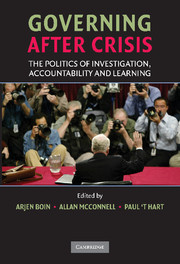Book contents
- Frontmatter
- Contents
- List of illustrations
- List of tables
- Contributors
- Introduction
- Part I Crisis-induced accountability
- 2 Weathering the politics of responsibility and blame: the Bush administration and its response to Hurricane Katrina
- 3 A reversal of fortune: blame games and framing contests after the 3/11 terrorist attacks in Madrid
- 4 Flood response and political survival: Gerhard Schröder and the 2002 Elbe flood in Germany
- 5 The politics of tsunami responses: comparing patterns of blame management in Scandinavia
- 6 Dutroux and dioxin: crisis investigations, elite accountability and institutional reform in Belgium
- Part II Crisis-induced policy change and learning
- Conclusion
- Index
- References
4 - Flood response and political survival: Gerhard Schröder and the 2002 Elbe flood in Germany
Published online by Cambridge University Press: 04 June 2010
- Frontmatter
- Contents
- List of illustrations
- List of tables
- Contributors
- Introduction
- Part I Crisis-induced accountability
- 2 Weathering the politics of responsibility and blame: the Bush administration and its response to Hurricane Katrina
- 3 A reversal of fortune: blame games and framing contests after the 3/11 terrorist attacks in Madrid
- 4 Flood response and political survival: Gerhard Schröder and the 2002 Elbe flood in Germany
- 5 The politics of tsunami responses: comparing patterns of blame management in Scandinavia
- 6 Dutroux and dioxin: crisis investigations, elite accountability and institutional reform in Belgium
- Part II Crisis-induced policy change and learning
- Conclusion
- Index
- References
Summary
Introduction: floods and political tides
In August 2002, six weeks before the German federal election on 22 September and right before the flash flood in eastern Germany, only 44 percent of voters would have chosen the incumbent government coalition of Social Democrats and the Green Party. A majority of 51 percent favoured a coalition of conservatives and liberals. After the flood, the picture had changed dramatically: 53 percent would have voted for the incumbent government and only 43 percent for the CDU opposition. The timing of this remarkable shift suggests that the crisis must have had some positive influence on the government's or the chancellor's popularity. This view is supported by the possible elite enhancement features of crisis, especially of incomprehensible ones, which give political leaders considerable space for political action and framing efforts, as already spelled out in the introduction to this volume. Hence, if we assume this to be the case, the question is: What made this happen? What did Schröder and his government do about the crisis to cause this reversal in their electoral fortune? What made a significant segment of the German voters abandon their prior predispositions? What made them change their evaluation of the government's record?
German researchers have taken up this question and explained the positive impact of the Elbe flash flood on government popularity as a consequence of the effective crisis management performance of Chancellor Schröder and his party (Roth and Jung 2002: 7; Jung 2003: 24; Hilmer 2003: 194).
- Type
- Chapter
- Information
- Governing after CrisisThe Politics of Investigation, Accountability and Learning, pp. 85 - 113Publisher: Cambridge University PressPrint publication year: 2008
References
- 13
- Cited by

